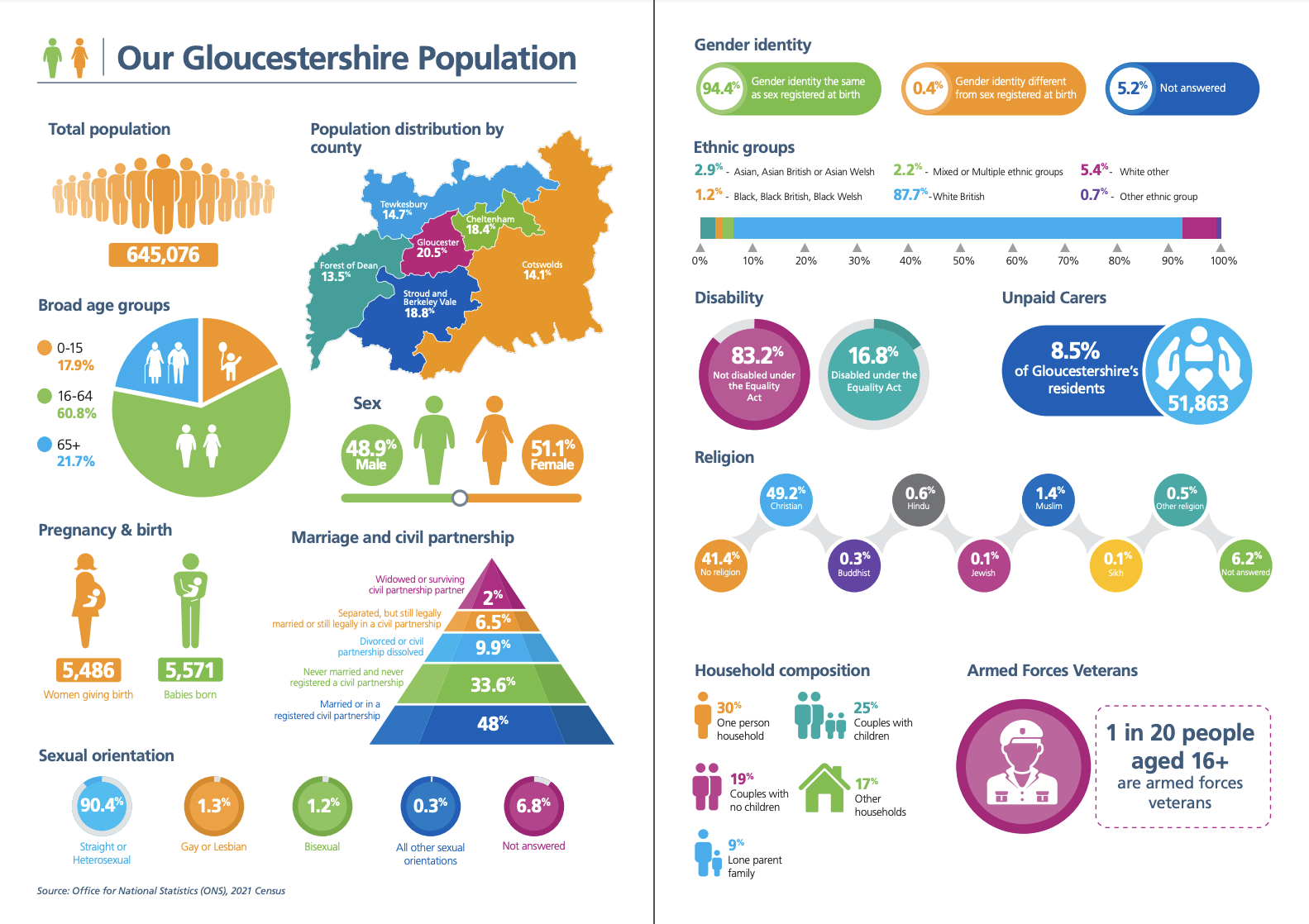We want to understand the needs of our diverse community and strive to treat everyone as an individual, with dignity and respect, in accordance with their human rights.
NHS Gloucestershire ICB is committed to upholding the NHS Constitution and, specifically in relation to equality, diversity and human rights, the principle which requires us to provide “a comprehensive service, available to all irrespective of gender, race, disability, age, sexual orientation, religion or belief, gender reassignment, pregnancy and maternity or marital or civil partnership status”.
We recognise that Gloucestershire has a diverse population and that individuals may have multiple identities which can cut across more than one protected characteristic; e.g. we all have an age and a racial identity. Some of our characteristics may change over the course of our lives, e.g. we may acquire a disability, some of us may change our religion.
To help us understand “what matters to you”, we undertake a significant amount of local engagement across the county. Working in partnership with voluntary sector and community groups and organisations across One Gloucestershire (our Integrated Care System) we aim to provide a range of opportunities for people to get involved and influence local health care services. To find out more about our engagement work and how we can support you to get involved, click here.
The Public Sector Equality Duty (PSED)
The PSED is designed to support ICBs and other bodies to think about equality across our work programme, to identify the major challenges and to agree the actions we will take to tackle them.
The PSED consists of a general duty and specific duties. The general duty requires ICBs to think about how they can prevent discrimination, advance equality and foster good relations. This applies to the services that are provided and commissioned and to the employment of staff. The PSED requires a thorough consideration of the needs of people with each protected characteristics and is therefore different to the focus of the health inequalities duty which includes a focus on geographical inequalities and other non-protected characteristic inequalities.
The specific duty requires the ICB to be transparent about our work on equality and to show how we are meeting the requirements of the general duty. Each year we must publish equality information that demonstrates how we are thinking about equality across the services we provide and commission and the employment of staff.
ICBs should also have one or more published equality objectives, that are specific and measurable and cover a period of up to four years.
Our Equality Statement
We are currently reviewing the monitoring and governance arrangements we have in place to provide assurance that NHS Gloucestershire is fulfilling its duties in relation to equality, diversity and inclusion. Some of the documents included in this section are subject to review following engagement with our staff and local partners.
Promoting equality, valuing diversity sets out our expectation that all NHS Gloucestershire staff will take responsibility for promoting equality; commissioning accessible services that respond to the diverse needs of communities in Gloucestershire. The Statement also establishes our commitment as an employer; celebrating the diversity of our workforce and ensuring staff feel they work in an environment that is fair, open and free from discrimination.
Additional information about our equality statement is available here.
Equality Objectives
In line with the Public Sector Equality Duty requirements we are required to have one or more published equality objectives, that are specific and measurable and cover a period of up to four years. In recognition of the issues identified through our EDS assessment and drawing upon existing priorities for the ICB, we have recently reviewed our 3 equality objectives for the ICB. The following objectives are underpinned by an action plan.
- To develop an Equality Statement and robust action plan for promoting equality, diversity and inclusion, which sets out clear objectives which ensure good practice across our organisation and link to wider health inequalities work that is being undertaken in our Integrated Care System.
- Build a detailed understanding of our population and their health needs, through published data sets, improvements in the quality of our data recording and robust use of Equality and Engagement Impact Assessments.
- To reduce the percentage of staff experiencing discrimination at work from a manager/team leader or other colleagues in the last 12 months by at least 2% per annum over the next 3 years.
The Equality Delivery System
The Equality Delivery System (EDS) helps NHS organisations improve the services they provide for their local communities and provide better working environments, free of discrimination, for those who work in the NHS, while meeting the requirements of the Equality Act 2010.
The EDS comprises eleven outcomes spread across three Domains:
- Commissioned or provided services
- Workforce health and well-being
- Inclusive leadership.
Through discussion with local partners, staff and patient representatives our performance against these outcomes are evaluated, scored, and rated using available evidence and insight. Our latest evaluation is reported below and detailed in the EDS reporting template.
- Equality Delivery System (2024/25)
- Appendix – EDS Reporting (2024/25)
Overview of Gloucestershire’s Equality Information
The 2021 Census data information is now available providing us with more accurate and up to date information about the profile of our local population. The infographic below shows our position across the nine protected characteristics.
We also use information from the Inform Gloucestershire website, Joint Strategic Needs Assessment and bespoke datasets to review and develop services and support for our local communities.


